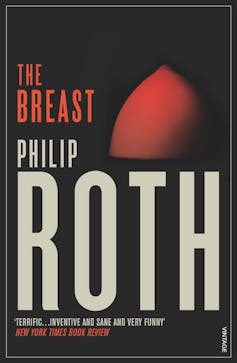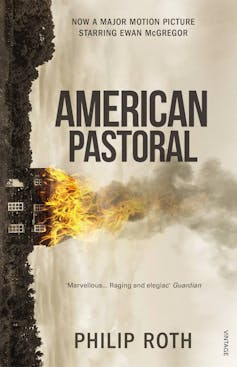Philip Roth was the best post-war American writer, no ifs or buts
Philip Roth was the best post-warAmerican writer, no ifs or butsMay 24, 2018 12.28am AEST
Mondadori Publishing House/HAND/EPA
Author
Professor of Contemporary Literature, University of Reading
--------------
For so long an enfant terrible of the American literary world, by the end of his life Philip Roth had become one of its elder statesmen. In a career that spanned more than half a century, Roth’s work ran the gamut of literary modes and genres.
There’s the high seriousness of Letting Go (1962) and the low humour of The Great American Novel (1973). There are the extravagant excesses of Portnoy’s Complaint (1969), couched in the form of a psychoanalytical monologue, and the pared-down, elliptical exchanges of Deception(1990), a novel written entirely in dialogue.
 Vintage
VintageThen think of the social realism of Goodbye, Columbus (1959), that’s plot turns on the use of a birth control device in the period prior to the availability of the contraceptive pill, or the grotesque surrealism of The Breast (1972), the story of a professor of literature who metamorphoses overnight into a giant mammary gland. The versatility and variety of his work doesn’t end there. He also wrote an outrageous satire of an incumbent president in Our Gang (1971) and a dystopian tale of a fascist presidency in The Plot Against America(2004).
Although the style and content of Roth’s fiction is extraordinarily diverse, there is always audible a distinctive voice: irreverent yet earnest, questioning yet authoritative, subtle and nuanced yet powerful and passionate. But above all, Roth is obsessive, compulsive, restless, driven.
In an interview with the Paris Review in 1984, Roth remarked of his 1983 novel The Anatomy Lesson that: “The book won’t leave you alone. Won’t let up.” This applies equally to all his work. Roth’s work grabs you and won’t let you go. At one point in The Ghost Writer (1979) Nathan Zuckerman – the author protagonist of many of Roth’s novels – is told by his mentor, E I Lonoff, that he has “the most compelling voice I’ve encountered in years”.
It is that compelling voice which bewitched me when I read the opening pages of Portnoy’s Complaint as a teenager. It is that voice which still held me in thrall as I read the final words of his final novel, Nemesis(2010), as a middle-aged professor.
I have been reading Roth for over 30 years and writing about him, on and off, for more than two decades, and as with any long-term relationship, mine with Roth has had its ups and downs. But I have never felt like walking out or giving up. Roth will be remembered – and deserves to be celebrated – for his fearlessness, his formal audacity and stylistic brilliance, and his ability to reinvent himself in unexpected and sometimes startling ways.
In terms of his critical reputation, you could divide Roth’s career into three phases. There are the early successes of Goodbye, Columbus and Portnoy’s Complaint in the late 1950s and 60s, respectively, followed by the relatively fallow years of the 1970s and 80s, and then the triumphant second coming in the 1990s and the 2000s.
 Vintage
VintageYet this narrative is too simplistic. The period of greatest critical hostility and indifference – a period in which, to quote Nathan Zuckerman (pre-empting Roth’s critics, as ever), the author was widely accused of “disappear[ing] right up [his] own asshole” – was also a period of intensive experimentation, which revealed Roth’s refusal to rest on his laurels and determination to interrogate his own aesthetic and ethical beliefs with a rigour of which very few artists are capable.
Although the work produced in the 1970s and 80s was uneven, it paved the way for much of what was to follow and resulted in two masterpieces – The Ghost Writer (1979) and The Counterlife (1986). These novels stand alongside Sabbath’s Theater (1994) and American Pastoral (1997) as among the greatest post-war American novels.
Roth was a writer who polarised opinion, provoking strong reactions in many of his readers, but whether you loved him or hated him, his canonical status is beyond question. I believe he will come to be seen not merely as the preeminent post-war American novelist but as the most important American author of the 20th and early 21st centuries.
No comments:
Post a Comment